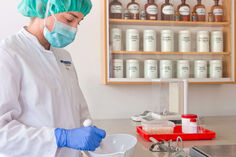Certification of the manufacturing plant
InPhaSol - Intelligent Pharmaceutical Solutions
In the pharmacy, carefully assured quality is closely associated with a product - the medicine. A large number of laws, regulations and legal provisions apply here. Statutory provisions such as the German Social Code oblige all healthcare providers to implement quality assurance measures.
The pharmacy at Heidelberg University Hospital was first certified according to DIN EN ISO 9001:1994 in 1997. Since then, our quality management system has been audited every year by an external certification organisation.
A new addition is the Heidelberg University Hospital's manufacturing facility for investigational medicinal products - InPhaSol (Intelligent Pharmaceutical Solutions). In 2004, the manufacturing plant received ISO 9001:2000 certification for the first time, and since then InPhaSol's quality management system has also been audited by an external company every year. The manufacturing company is currently certified according to DIN EN ISO 9001:2008.
The certification of the pharmacy and the manufacturing plant has enabled us to present our service character to the outside world. The pharmaceutical and organisational quality as well as our own profitability can be proven at any time.
As the University Hospital's manufacturing facility for investigational medicinal products, the pharmacy fulfils the requirements that apply to all pharmaceutical companies and thus ensures that high-quality medicinal products are produced. Staff with sufficient professional qualifications are required by law. Chief Pharmacist Dr T. Hoppe-Tichy is qualified as a Qualified Person in accordance with the German Medicines Act. Production and analysis must be strictly separated and report to the head of production or the head of quality control.
The type, size, number, location and equipment of the operating rooms must guarantee the flawless manufacture, testing, storage, packaging and placing on the market of the medicinal products. A sufficient standard of hygiene in these rooms is decisive for the quality of the medicinal products manufactured. The pharmacy must demonstrate that this standard is maintained at all times through appropriate inspections.
The primary task of the quality management system is to ensure the quality of the products during production and quality control, but also to take precautions in advance and introduce appropriate measures to ensure that problems do not occur or cannot occur again. In the industrial sector, 10% of quality costs are spent on defect prevention, 40% on intermediate inspections, but 50% on defect elimination. This is in contrast to the defect prevention concept of quality management.
Examples include the qualification of devices and equipment and the preventive system of maintenance and servicing of devices and equipment. These measures prevent defects in the devices and equipment from being observed after the manufacturing steps have been carried out, which then subsequently jeopardise the quality of the products. Regular training and further training of employees contribute to the production of high-quality medicinal products.
The QMS is a prerequisite for continuous quality improvement. Customer satisfaction is at the centre of all efforts. For the pharmacy, this ultimately means patient satisfaction.
Recurring audits are carried out to check whether the quality-related activities and processes and the associated results fulfil the planned and defined requirements. It is also checked whether these requirements have been realised and are suitable for achieving specified goals such as quality and therefore customer satisfaction.


